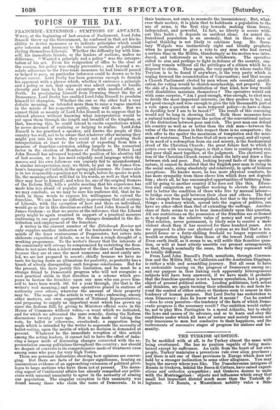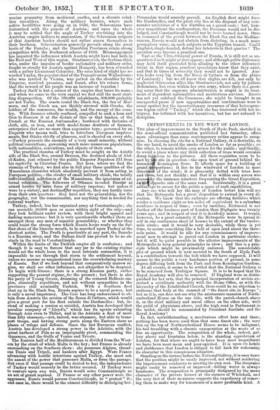THE TURKISH QUESTION.
To be meddled with at all, is for Turkey almost the same with being overturned. She has no position capable of being main- tained except by sufferance. An exile from the heart of her own people, Turkey maintains a precarious rule over alien provinces ; and there is not one of those provinces in Europe which does not hold by a stronger inclination to some other allegiance. You may begin the survey where you like. The Pansclavonian intrigues of Russia in Grahova, behind the Bocce di Cattaro, have raised expect- ations and orthodox sympathies ; and Grahova desires to unite with the Montencgrines : objects and influences which sway that small but important district much more than the Turkish al- legiance. I n Bosnia, a Muni:amen nobility rules a Scla- vonian peasantry from medieval castles, and a chronic rebel- lion smoulders. Along the military frontier, where such active hostilities were going on in 19.11, the Selavonians have fraternized with the guards of Austria; and upon the whole it may be settled that the angle of Turkey stretching into the Austrian empire inclines to annexation, if the Sclavonian subjects of that Austrian border should not rather annex themselves to their brethren. Selavonianism generally prevails along the great basin of the Danube; and the Danubian Provinces retain strong sympathies with the Bucharest scheme of 1848. Mismanagement has impaired the influences which Austria might have had both in the East and West of this region. Stratimirovioh, the Serbian chief, who, under the impulse of border nationality and military order, fought so stoutly for Austria against Hungary, has been rewarded with a paltry Lieutenant-Colonelcy. The same kind of slight has re- warded Yanku, the popular chief of the Transylvanian Wallachians ; who was invited to Vienna, was patted on the shoulder by the Emperor, received promises, and found, after his return home, that the reward of his people was an increase of taxation !
Turkey itself is but a corner of the empire that bears its name ; and when we come to the very capital we find still the most start- ling disproportion. Of the 700,000 inhabitants, 300,000 probably are not Turks. The coasts round the Black Sea, the Sea of Mar- mora, and the Greek sea, are thickly strewed with Greeks, the holders of the commerce, the wealth, and the energy of the coun- try. With finances utterly eonfused, compelled to seek a loan and then to disavow it at the dictate of this or that banker, of the French or the Russian Ambassador ; burdened with factories of cloth, silk, or iron, and with model-farms destitute of farmers, enterprises that are no more than expensive toys ; governed by an Emper4r who means well, tries to introduce European improve- ments,"but thinks chiefly of pleasure, and is cheated on every side, —Turkey presents the anomaly of a very small minority, without political convictions, governing much more numerous populations, with nationalities, convictions, and objects of their own.
The practical stamina of Turkey must be sought on the Asiatic side of the Black Sea, around Broussa, the destined abode of Abd- el-Kader, just released by the politic Emperor Napoleon III from his captivity in Christian France. But here, where we find the stamina of Turkey, we find also in full play those qualities of the Mussulman character which absolutely prevent it from acting in European politics,—the rivalry of small military chiefs, the totally individualized selfishness of the Mussulman, the ignoranoe of ex- ternal relations. The followers of Othman invaded Europe as armed hordes by mere force of military impetus ; but unless it were to a victory, not destined:for repetition, they can hardly issue from their own-quarters : they have not the generalship, nor the geography, nor the commissariat, nor anything that is needed for external warfare.
Turkey, indeed, has her organized army at Constantinople ; she can assemble 50,000 men or more within sight of the city—and they look brilliant under review, with their bright apparel and dashing mancenvres : but it is very questionable whether there are amongst them any men of superior generalship; or whether they could resist the strong force which Russia keeps ready on the fur- ther shore of the Danube mouth, to be marched upon Turkey at the shortest notice. The Pruth is practicable at any part, the banube is a Russian river, and the Balkan itself has proved to be no ob- stacle in the road to Constantinople.
Within the limits of the Turkish empire all is confusion; and though it is easy to foresee that any jar to the existing regime would set the whole loose in the most intricate commotion, it is impossible to see through that storm to the settlement beyond, unless we assume as unquestioned issue the overwhelming mastery of Russia. But if we look beyond that comparatively narrow re- gion, we shall see other influences, not altogether to be despised. To begin with Greece : there is a strong Russian party, rather supporting the present regime, for the present ; but there is also the party of Young Greece, dreaming of the restored Hellenic em- pire, classically republican, and not without sympathies in the provinces still nominally Turkish. With a Southern fleet shut up in the Black Sea, Russia aspires to be a naval power, but is only a naval impotency. The Czar has long endeavoured to ob- tain from Austria the cession of the Bocca di Cattaro, which would give a great port for his fleet outside the Dardanelles : but, in- stead of making a cession so suicidal, Austria has developed that peculiar company of "Lloyd's," which has its agents extending through Asia even to Thibet, and in the Adriatic a fleet of more than fifty steamers —not, indeed, war-steamers, but able to trans- port troops, and having strong ports along the Eastern shore as places of refuge and defence. Since the last European conflict, Austria has developed a strong power in the Adriatic, with the great harbour of Pole as an impregnable pivot, commanding the Quarnero, and the Gulfs of Venice and Trieste. The Eastern half of the Mediterranean is divided from the West- ern by the strait of which Malta is the key; but France is already encroaching on the Southern shore : she possesses Algiers, threat- ens Tunis and Tripoli, and hankers aftert. Were France advancing with hostile intentions against TErfay, she must ask the assent of the power that possesses Malta, or force the passage. -Bat even if that passage could be denied to her, the independence of Turkey would scarcely be the better secured. If Turkey were to venture upon any war Russia would seize Constantinople as an act of grand reprisal. If France or any other power were the aggressor, Russia would possess Constantinople, to " protect " it; and once in, there would be the utmost difficulty in dislodging her. Persuasion would scarcely prevail. An English fleet might force the Dardanelles, and the great city lies at the disposal of any com- mander ambitious of a feu d'artifice on a grand Beale : but, how- ever magnificent the conflagration, the Russians would not be dis- lodged, and Constantinople would not be twice burned down. Once in command of the portal between the Black Sea and the Mediter- ranean, Russia would not abstain from dictating, in a much more peremptory voice, on such subjects as the Egyptian transit. Could England., single-handed, defend her interests in that quarter? The question may become a practical one.
Vast as the Ultra-Oriental power of Russia, it is still not so un- questioned as it might at first appear ; and although polite diplomacy may hold itself precluded from alluding to the other influences latent in that region, practical speculators know that they exist, and that in times of necessity they would not be ignored. Aus- tria looks very big from the Bocca di Cattaro or from the plains of Lombardy ; but we all know that slights are felt, not only by neglected Sclavonian allies like Stratimirovich, not only by jealous Bohemians, but even within her own army, where there is a grow- ing sense that the supreme administration is stupid in its treat- ment of dependent nationalities and meritorious services. Russia has not yet subdued the Caucasus; she might be brought to an unexpected pause if new opportunities and combinations were to array against her the insurrectionary resources of that heterogene- ous region called " Turkey," which she has traversed with her in- trigues, has inflamed with her incentives, but has not reduced to discipline.



























 Previous page
Previous page